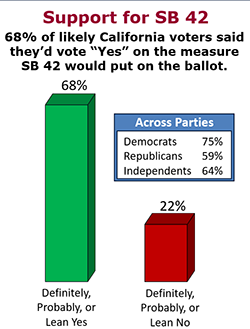SACRAMENTO, CA -- Today, Governor Jerry Brown signed into
law the landmark California DISCLOSE Act (AB 249),
the nation's most comprehensive election disclosure
law.
"No more fine print," said the bill's author,
Speaker pro Tem Kevin Mullin. "California voters will
now be able to make informed decisions, based on honest
information about who the true funders are of campaign ads.
This transparency is critical to our democracy and I am
proud that California has taken this historic first step to
shine the light on 'dark money'. Hopefully this will
encourage others to follow suit."
Assembly Bill 249, authored by Assemblymembers Kevin Mullin
(D-San Mateo) and Marc Levine (D-San Rafael), and sponsored
by the California Clean Money Campaign, requires ballot
measure ads and independent expenditure ads for or against
candidates to clearly and prominently disclose the identity
of their top three funders, and includes
first-in-the-nation follow-the-money rules to make ballot
measure ads show their true funders.
"With the quiet gesture of a signature, Governor Brown
has loudly proclaimed California to be the national leader
on the most important issue of our era: taking our
democracy back from the special interests and restoring it
to the people," said Trent Lange, President of the
California Clean Money Campaign, sponsor of AB 249.
"Every American who cares about democracy owes Governor
Brown, Assembly Speaker pro Tem Kevin Mullin, and all the
bold leaders in the California Legislature of both parties
who helped AB 249 pass an enduring debt of
gratitude."
AB 249's overwhelming passage through the legislature also
represents an uncommon bipartisan victory for campaign
finance reform legislation that hopefully bodes well for
the future, with every Democrat in both the Senate and
Assembly joined by seven Republicans: Senators Anthony
Cannella (R-Ceres) and Scott Wilk (R-Santa Clarita) and
Assemblymembers Dante Acosta (R-Santa Clarita), Catharine
Baker (R-San Ramon), Tom Lackey (R-Palmdale), Brian
Maienschein (R-San Diego), and Marc Steinorth (R-Rancho
Cucamonga).
A crucial role in AB 249's passage was played by not only
author Assembly Speaker pro Tem Kevin Mullin and joint
author Assemblymember Marc Levine, but also by principal
co-authors Senate President pro Tem Kevin de Leon (D-Los
Angeles), Senators Ben Allen (D-Santa Monica), Jerry Hill
(D-San Mateo), and Henry Stern (D-Calabasas), along with
Assemblymembers Marc Berman (D-Los Altos), Matthew Dababneh
(D-Van Nuys), and Adrin Nazarian (D-Van Nuys). The other 18
coauthors of the bill and Assembly Speaker Anthony Rendon
(D-Los Angeles) were also key to its success.
Robert Stern, a principal co-author of the Political Reform
Act of 1974 and adviser on AB 249, said, "I am pleased
the Governor signed AB 249. It represents a major
advancement in disclosure on ads for both ballot measures
and independent expenditures for and against
candidates."
Other leaders who played crucial roles in the ultimate
passage of AB 249 are the previous California DISCLOSE
Act authors who each moved the bill forward on
different steps of the way over the last seven years,
starting with then Assemblymember (and now Congressmember)
Julia Brownley (author of AB 1148 and AB 1648 in 2011 and
2012), Senators Mark Leno and Jerry Hill (authors of SB 52
in 2013 and 2014), then-Assemblymember and now
Congressmember Jimmy Gomez (author of AB 700 in 2015 and
2016 and original author of AB 14 and AB 249 this
year).
But the biggest thanks for AB 249's passage goes to the
incredible grassroots and coalition movement that propelled
the California DISCLOSE Act forward each year for
the last seven years. The victory came after more than 350
organizations and leaders endorsed AB 249, over 100,000
Californians signed petitions, tens of thousands of Clean
Money supporters sent emails, many thousands made phone
calls, hundreds packed hearing rooms, and other outpourings
of grassroots activism.
Unheralded but heroic Clean Money leaders who worked on the
California DISCLOSE Act for years include
dedicated, unpaid volunteer coordinators like Gary Appell
in Marin County, Suzie Arnett in Stockton, Craig Dunkerley
in San Jose, Ellie Garabedian in Fresno, James McCord in
San Diego County, Nancy Neff in Palo Alto, Teresa Priem in
the San Fernando Valley, David Schmidt in San Francisco
(and beyond), David Sonneborn and John Goodman in Orange
Country, Shirley Shelangoski in the East Bay Area, Kevin
Wolf in Davis, and countless others. They were organized by
a small but hard-working California Clean Money Campaign
and California Clean Money Action Fund staff including
Catherine Ashworth, Katherine Carpio, Trent Lange, and
D'Marie Mulattieri.
"It is both fitting and unsurprising that this landmark,
against-all-odds legislative victory for democracy was won
the same way our republic was secured: by thousands and
thousands of passionate volunteer Americans who selflessly
devoted -- as in the final sentence of the Declaration of
Independence -- 'their lives, their fortunes and their
sacred honor' to the cause," said Trent Lange. "Make
no mistake about it, this was people power in action and
this landmark victory belongs to those countless heroes who
made phone calls, wrote emails, made signs, raised small
contributions, and raised big hell until the legislature
passed AB 249 and Governor Brown signed it."
#####
California Clean Money Campaign is a non-partisan 501(c)(3)
organization that has been dedicated to educating the
public about the need to lessen the unfair influence of Big
Money on election campaigns since 2001. For further
information, visit www.CAclean.org



